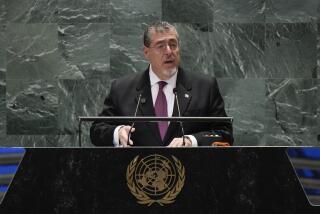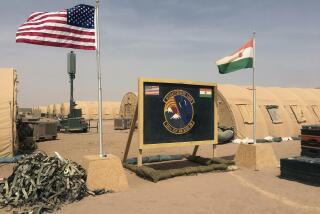Liberia to Get a U.N. Force
- Share via
UNITED NATIONS — The Security Council voted unanimously Friday to establish a 15,000-strong U.N. peacekeeping force for Liberia to help stabilize the West African country and disarm militias still running rampant after former President Charles Taylor was forced into exile last month.
The peacekeepers will take over by Oct. 1 from a 3,500-strong multinational force stationed in Monrovia, the capital. Some of the soldiers already in Monrovia will be absorbed into the peacekeeping operations, U.N. officials said, but the new operation won’t be fully in place until March.
The resolution also provides for 1,115 international police officers.
Liberia is being portrayed as a potential success story for the United Nations, an instance when the Security Council has been able to muster an emergency multinational effort to intervene in a growing humanitarian crisis, then hand it off to a longer-term U.N. peacekeeping and nation-building operation.
The United States sponsored Friday’s resolution after months of pressure to take the lead in stabilizing the country. Nearly a dozen nations are offering troops, a marked contrast to the silence after the U.S. call for multinational help in Iraq, diplomats pointed out.
“The U.N. is playing its real role in this mission,” Angolan Ambassador Ismael Abraao Gaspar Martins said. “It’s a good example of what the U.N. can do when it’s used properly.”
Two U.S. ships anchored off Monrovia will return home with their 3,200 sailors and Marines. But eight to 10 U.S. military advisors will stay in Liberia to help with demobilization of the ragtag armies and stabilization of the ravaged country. Their presence is meant to be mostly symbolic, showing other governments interested in helping rebuild Liberia that the United States will maintain a presence through the long process.
“The general consensus is that this is a failed state,” Jacques Klein, the U.N.’s special envoy to Liberia, said this week. “Now we have to rebuild the state.”
The country, founded in 1847 by freed American slaves, has been stripped of its resources by former president Taylor, who allegedly treated the country’s treasury as his own while in office, and left with $100 million of Liberia’s money, U.N. officials said.
His forced exile to Nigeria was meant to quell a three-way civil war between the government and two rebel groups. But he has established a government in exile, issuing orders by cellphone, Klein said after a visit to Liberia this month.
The rebel groups, composed largely of child soldiers, are slowly dissolving, but with little food and no jobs, this has led to widespread anarchy.
“The former troops are robbing and raping,” Klein said. “This situation will get worse before it gets better, as the fighting is over and there is not yet any U.N. mission in place.”
Several countries have offered troops, including Bangladesh, Pakistan, South Africa, Ethiopia and Namibia, Klein said. Ireland may supply a headquarters company and Russia may contribute 1,200 soldiers. The Czech Republic, Slovakia, Romania and Bulgaria also have expressed interest in contributing troops.
Nigeria, Togo, Guinea, Ghana, Guinea-Bissau, Senegal and South Africa already have troops in Liberia.
Besides security, hundreds of millions of dollars are needed to rebuild the infrastructure, starting with the main port and the electricity grid, Klein said.
Outlining the tasks ahead in a briefing for the Security Council this week, Klein said he would ask donors to help fund disarmament, demobilization and re- integration of the ex-combatants, 79% of whom are younger than 18. He also said judicial reform and humanitarian assistance were needed.
More to Read
Sign up for Essential California
The most important California stories and recommendations in your inbox every morning.
You may occasionally receive promotional content from the Los Angeles Times.










